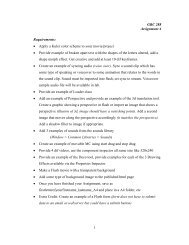Introducing Financial Accounting - CCSN Computer Graphics Program
Introducing Financial Accounting - CCSN Computer Graphics Program
Introducing Financial Accounting - CCSN Computer Graphics Program
You also want an ePaper? Increase the reach of your titles
YUMPU automatically turns print PDFs into web optimized ePapers that Google loves.
wiL27041_ch01_002-047.indd Page 7 10/4/10 7:12:18 PM user-f499 /Volumes/204/MHBR211/wiL27041_disk1of1/0073527041/wiL27041_pagefiles<br />
The majority of accounting opportunities are in<br />
private accounting, which are employees working<br />
for businesses, as shown in Exhibit 1.4. Public accounting<br />
offers the next largest number of opportunities,<br />
which involve services such as auditing and<br />
tax advice to a vast range of businesses. Still other<br />
opportunities exist in government and not-for-profit<br />
agencies, including business regulation and investigation<br />
of law violations.<br />
<strong>Accounting</strong> specialists are highly regarded and<br />
Chapter 1 <strong>Introducing</strong> <strong>Financial</strong> <strong>Accounting</strong> 7<br />
Private<br />
accounting<br />
60%<br />
Government,<br />
not-for-profit and<br />
education 16%<br />
Public<br />
accounting<br />
24%<br />
their professional standing is often denoted by a certificate. Certified public accountants (CPAs)<br />
must meet education and experience requirements, pass an examination, and exhibit ethical<br />
character. Many accounting specialists hold certificates in addition to or instead of the CPA.<br />
Two of the most common are the certificate in management accounting (CMA) and the certified<br />
internal auditor (CIA). Employers also look for specialists with designations such as certified<br />
book keeper (CB), certified payroll professional (CPP), personal financial specialist (PFS), certified<br />
fraud examiner (CFE), and certified forensic accountant (CrFA).<br />
Individuals with accounting knowledge are always in demand as they can help with financial<br />
analysis, strategic planning, e-commerce, product feasibility analysis, information technology,<br />
and financial management. Benefit packages can include flexible work schedules, telecommuting<br />
options, career path alternatives, casual work environ ments, extended vacation time, and<br />
child and elder care.<br />
Demand for accounting specialists is strong. Exhibit 1.5 reports average annual salaries for<br />
several accounting positions. Salary variation depends on location, company size, professional<br />
designation, experience, and other factors. For example, salaries for chief financial officers<br />
(CFO) range from under $75,000 to more than $1 million per year. Likewise, salaries for bookkeepers<br />
range from under $30,000 to more than $80,000.<br />
Field Title (experience) 2009 Salary 2014 Estimate*<br />
Public <strong>Accounting</strong> Partner . . . . . . . . . . . . . . . . . . . . . . . . . . . $191,000 $211,000<br />
Manager (6 – 8 years) . . . . . . . . . . . . . . . . 94,500 104,000<br />
Senior (3 – 5 years) . . . . . . . . . . . . . . . . . . 72,000 79,500<br />
Junior (0 – 2 years) . . . . . . . . . . . . . . . . . . 51,500 57,000<br />
Private <strong>Accounting</strong> CFO . . . . . . . . . . . . . . . . . . . . . . . . . . . . . 232,000 256,000<br />
Controller/Treasurer . . . . . . . . . . . . . . . 147,500 163,000<br />
Manager (6 – 8 years) . . . . . . . . . . . . . . . . 87,500 96,500<br />
Senior (3 – 5 years) . . . . . . . . . . . . . . . . . . 72,500 80,000<br />
Junior (0 – 2 years) . . . . . . . . . . . . . . . . . . 49,000 54,000<br />
Recordkeeping Full-charge bookkeeper . . . . . . . . . . . . . 57,500 63,500<br />
Accounts manager . . . . . . . . . . . . . . . . . . 51,000 56,500<br />
Payroll manager . . . . . . . . . . . . . . . . . . . . 54,500 60,000<br />
<strong>Accounting</strong> clerk (0 – 2 years) . . . . . . . . . 37,500 41,500<br />
* Estimates assume a 2% compounded annual increase over current levels (rounded to nearest $500).<br />
Quick Check Answers — p. 28<br />
1. What is the purpose of accounting?<br />
2. What is the relation between accounting and recordkeeping?<br />
3. Identify some advantages of technology for accounting.<br />
4. Who are the internal and external users of accounting information?<br />
5. Identify at least five types of managers who are internal users of accounting information.<br />
6. What are internal controls and why are they important?<br />
EXHIBIT 1.4<br />
<strong>Accounting</strong> Jobs by Area<br />
Point: The largest accounting firms are<br />
Deloitte, Ernst & Young, KPMG, and PricewaterhouseCoopers.<br />
Point: Census Bureau (2009) reports<br />
that for workers 18 and over, higher<br />
education yields higher average pay:<br />
Advanced degree . . . . . . . . . . $80,977<br />
Bachelor’s degree. . . . . . . . . . 57,181<br />
High school degree . . . . . . . . 31,286<br />
No high school degree. . . . . . 21,484<br />
EXHIBIT 1.5<br />
<strong>Accounting</strong> Salaries for<br />
Selected Fields<br />
Point: For updated salary information:<br />
Abbott-Langer.com<br />
www.AICPA.org<br />
Kforce.com<br />
Quick Check is a chance to<br />
stop and reflect on key points.









